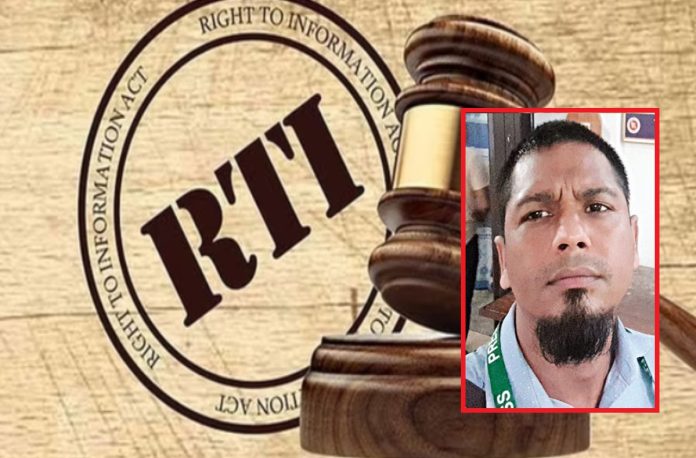In a concerning development for press freedom in Bangladesh, journalist Shafiuzzaman Rana finds himself behind bars for attempting to exercise his right to information under the Right to Information Act (RTI). Rana, a correspondent for Bangla daily Desh Rupantor in Nakla area under Mymensingh district, was sent to jail for six months on allegations of misbehavior during his pursuit of information under RTI from the UNO office in Sherpur’s Nakla area on March 5, 2024.
Journalist Shafiuzzaman Rana’s ordeal sheds light on the challenges faced by journalists in Bangladesh when seeking information from government offices. Despite the provisions of the RTI Act, which grants citizens the right to access information, Rana’s case serves as a stark reminder of the risks journalists face when attempting to hold authorities accountable.
According to reports, Rana submitted an application under the RTI Act, seeking specific documents from the UNO office. However, instead of receiving the requested information, he was told to wait for at least 20 days. This delay tactic raises suspicions about the authorities’ intentions and their reluctance to comply with the RTI Act.
The situation escalated when Rana allegedly forced his way into the Confidential Assistant’s room at the UNO office and demanded the documents. Subsequently, he was accused of misbehaving with government officials and office staff, leading to his arrest and sentencing by a mobile court.
While the UNO office claims that Rana had been causing disturbances and making posts on social media for personal gain, his wife vehemently denies these allegations. She insists that Rana’s only intention was to submit a document and that his actions may have been misunderstood.
The response from the Information Commission of Bangladesh, which assigned an Information Commissioner to investigate the incident, suggests acknowledgment of the seriousness of the matter. However, concerns remain regarding the fairness of the trial and the impartiality of the legal process.
Of particular concern is the statement made by Nakla’s Upazila Nirbahi Officer, suggesting a deliberate delay in providing the requested information. Such actions not only violate the principles of transparency and accountability but also undermine the fundamental right to information guaranteed by law.
The implications of Rana’s case extend beyond his personal ordeal. It sends a chilling message to journalists across Bangladesh, indicating the risks associated with seeking information under the RTI Act. The fear of reprisal and intimidation may deter journalists from performing their vital role as watchdogs of society.
It may be mentioned here that, under Bangladesh’s Right to Information Act (RTI Act), non-compliance with a request seeking information constitutes an offense. Section 26 of the RTI Act outlines the penalties for failure to provide information. If a public official fails to provide information within the specified time limit or intentionally provides false information, they may be subject to disciplinary action or penalties as prescribed by law.
Furthermore, Section 27 of the RTI Act specifies that if a public official intentionally destroys, alters, conceals, or refuses to provide information, they may face imprisonment for a term not exceeding two years or a fine not exceeding twenty-five thousand takas, or both.
These provisions underscore the importance of compliance with the RTI Act and emphasize the legal obligations of public officials to provide information to citizens upon request. Non-compliance undermines the principles of transparency, accountability, and democracy enshrined in the RTI Act and may result in legal consequences for the responsible individuals.
International organizations dedicated to press freedom, including the International Federation of Journalists (IFJ), Reporters Sans Frontiers (RSF), PEN International, Society of Professional Journalists (SPJ), National Union of Journalists (NUJ), World Association of Newspapers and News Publishers (WAN-IFRA), Center for Media Freedom and Responsibility (CMFR), Index on Censorship, Media Legal Defence Initiative (MLDI), The Rory Peck Trust, Committee to Protect Journalists Asia, Media Institute of Southern Africa (MISA), International Organization of Journalists (IOJ), International Center for Journalists (ICJ), International Press Institute (IPI), Article 19, Freedom House and others, must closely monitor the situation in Bangladesh. Advocacy and pressure from these organizations are essential to ensure that journalists can operate freely and without fear of persecution.
The case of Shafiuzzaman Rana highlights the urgent need to safeguard press freedom and uphold the right to information in Bangladesh. The authorities must ensure a fair trial for Rana and take concrete steps to prevent similar incidents from occurring in the future. Failure to do so would further erode the already fragile state of press freedom in the country.




